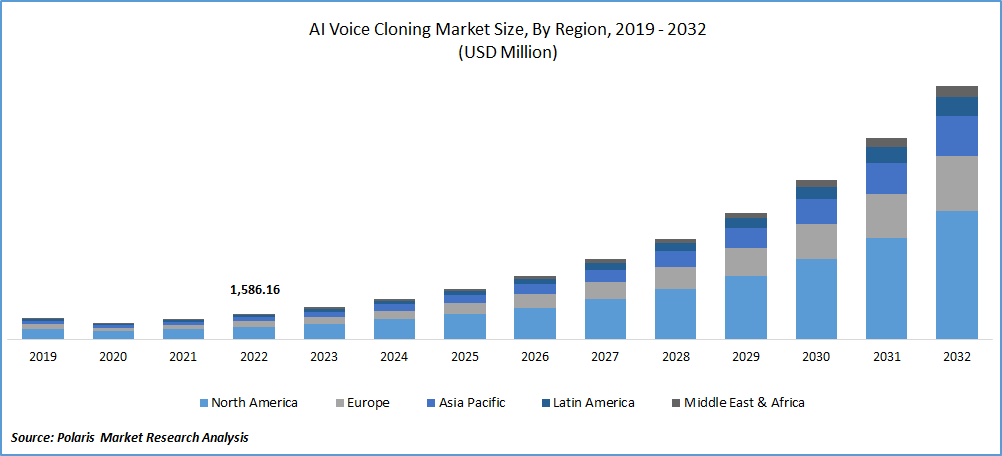
AI Voice Cloning Market Share, Size, Trends, Industry Analysis Report, By Component (Software, Service), By Deployment, By Application, By Vertical, By Region, And Segment Forecasts, 2024 - 2032
- Published Date:Jan-2024
- Pages: 112
- Format: PDF
- Report ID: PM3568
- Base Year: 2023
- Historical Data: 2019-2022
Report Outlook
The global AI voice cloning market was valued at USD 1992.06 billion in 2023 and is expected to grow at a CAGR of 25.90% during the forecast period. Many organizations are now utilizing AI cloning technologies to improve customer interactions and service in the customer service industry. AI cloning allows the creation of virtual customer service representatives to provide personalized assistance, interact naturally with customers, and efficiently resolve queries. By implementing AI clones, businesses can improve service efficiency, reduce costs, and increase customer satisfaction. This technology operates through advanced algorithms and networks, focusing on Generative Adversarial Networks (GANs) that produce synthetic data and distinguish it from real data. Additionally, AI clones integrated with Augmented Reality and Virtual Reality can enhance player engagement in the gaming industry. Overall, AI cloning benefits various sectors, particularly in customer service.

To Understand More About this Research: Request a Free Sample Report
Industry Dynamics
Growth Drivers
Ongoing advancements in deep learning algorithms and neural networks are crucial in AI cloning. These technologies enable the training and creation of sophisticated AI models replicating human-like behaviors, speech patterns, and decision-making processes. By leveraging deep learning and neural networks, organizations can develop AI clones that provide users with highly interactive and personalized experiences. Furthermore, advancements in NLP play a significant role in AI cloning. These advancements enable AI clones to understand and interpret natural language, enabling more natural and conversational user interactions. NLP advancements enhance the capabilities of AI clones in understanding context, sentiment, and intent, resulting in more accurate and effective responses.
Moreover, integrating AI clones with AR and VR technology extends beyond gaming and finds application in training simulations. Industries such as healthcare can benefit from AI clones acting as virtual patients in AR and VR simulations. By incorporating AI clones into training simulations, professionals can engage in safe & repetitive training, improving their skills. AI clones' realistic behaviors and responses contribute to a more authentic and effective training experience.

Report Segmentation
The market is primarily segmented based on component, deployment, application, vertical, and region.
|
By Component |
By Deployment |
By Application |
By Vertical |
By Region |
|
|
|
|
|
To Understand the Scope of this Report: Speak to Analyst
Software segment accounted for the largest market share in 2022
The software segment accounted for the largest market share. The trends observed in AI voice cloning focus on enhancing voice quality, enabling personalization, facilitating multilingualism and accented speech, and exploring real-time voice conversion capabilities. These advancements aim to create more natural and realistic voice cloning experiences. Improving voice quality is a crucial aspect of AI voice cloning solutions, with continuous efforts to produce voices that closely resemble human speech patterns and nuances. This includes advancements in vocal inflection, intonation, and expressiveness to achieve high-quality voice outputs.
The services segment witnessed the highest growth rate. AI voice cloning services offer businesses the ability to generate custom voice-overs for various applications, such as commercials, videos, e-learning content, audiobooks, and more. By leveraging AI voice cloning technologies, companies can streamline the voice-over production process and gain access to a wide range of voice options, providing flexibility and versatility in their projects. The impact of AI voice cloning services extends beyond the voice-over industry, transforming the media and entertainment sector. Content creators can utilize these services to generate voice-overs for characters, facilitating dubbing and localization processes. This allows for enhanced storytelling, improved audience engagement, and seamless content adaptation for different languages and cultural contexts.
Audiobooks and podcasting segment garnered largest share in 2022
The audiobook and podcasting segment held the largest revenue share. This segment's success can be attributed to the utilization of AI voice cloning technology, which enables the creation of high-quality synthetic voices capable of narrating audiobooks. Publishers in the audiobook industry leverage AI voice cloning to streamline and optimize the production process. By utilizing this technology, they can generate audiobooks more efficiently and cost-effectively than traditional methods relying solely on human narrators. AI voice cloning opens possibilities to convert a broader range of books into audio format, including those that may have been challenging or economically unviable to produce with human narrators alone.
The assistive technology segment registered steady growth. AI voice cloning technology enables the generation of synthetic voices that closely resemble an individual's unique voice. A personalized voice can be created by training the AI model on the person's existing voice recordings or using a similar voice as a reference. This personalized synthetic voice allows individuals to express themselves more authentically, enhancing their communication abilities and providing a sense of identity and autonomy.

APAC region is expected to witness steady growth during the forecast period
The APAC region is expected to grow steadily during the upcoming year. The vibrant startup culture in the region also contributes to the growth of the AI voice cloning market. Startups in this region are actively pursuing novel approaches and disruptive technologies in AI voice cloning, attracting investments and fueling entrepreneurial spirit. The collective efforts of technology companies, startups, academic institutions, and industry collaborations in the Asia Pacific are driving advancements in AI voice cloning. The region's rich talent pool, innovative mindset, and supportive ecosystem create a conducive environment for the growth and commercialization of AI voice cloning technologies.
North America registered a robust growth rate. The widespread popularity of virtual assistants and chatbots in the region has created a strong demand for advanced technologies to enhance their capabilities. AI voice cloning is crucial, enabling virtual assistants and chatbots to communicate with customers using more natural and human-like voices. The growing need for personalized and interactive customer experiences drives service integration. Businesses can deliver tailored and engaging interactions by employing AI voice cloning, creating a more seamless and human-like customer service environment.

Competitive Insight
Some of the major players operating in the global market include IBM Corp., Google LLC, Nuance Communications, Microsoft Corp., LumenVox, Descript, iSpeech, CandyVoice, and Amazon.com
Recent Developments
- Microsoft Corp. has launched its AI-powered Bing search engine on mobile devices in February 2023, which now includes a new voice chat feature. To improve the user experience, the company has integrated a chatbot powered by ChatGPT into the preview release of its iOS and Android mobile apps for Edge, Bing, and Skype. Users can now engage in verbal conversations with Bing through this chatbot.
AI Voice Cloning Market Report Scope
|
Report Attributes |
Details |
|
Market size value in 2024 |
USD 2502.82 million |
|
Revenue forecast in 2032 |
USD 15,764.09 million |
|
CAGR |
25.90% from 2024 – 2032 |
|
Base year |
2023 |
|
Historical data |
2019 – 2022 |
|
Forecast period |
2024 – 2032 |
|
Quantitative units |
Revenue in USD million/billion and CAGR from 2024 to 2032 |
|
Segments covered |
By Component, By Deployment, By Application, By Vertical, By Region |
|
Regional scope |
North America, Europe, Asia Pacific, Latin America; Middle East & Africa |
|
Key companies |
IBM Corp., Google LLC, Nuance Communications, Microsoft Corp., LumenVox, Descript, iSpeech, CandyVoice, and Amazon.com |
FAQ's
key companies in AI Voice Cloning Market are IBM Corp., Google LLC, Nuance Communications, Microsoft Corp., LumenVox, Descript, iSpeech.
The global AI voice cloning market expected to grow at a CAGR of 25.8% during the forecast period.
The AI Voice Cloning Market report covering key are component, deployment, application, vertical, and region.
key driving factors in AI Voice Cloning Market are Ongoing advancements in deep learning algorithms and neural networks.
The global AI voice cloning market size is expected to reach USD 15,764.09 million by 2032.
